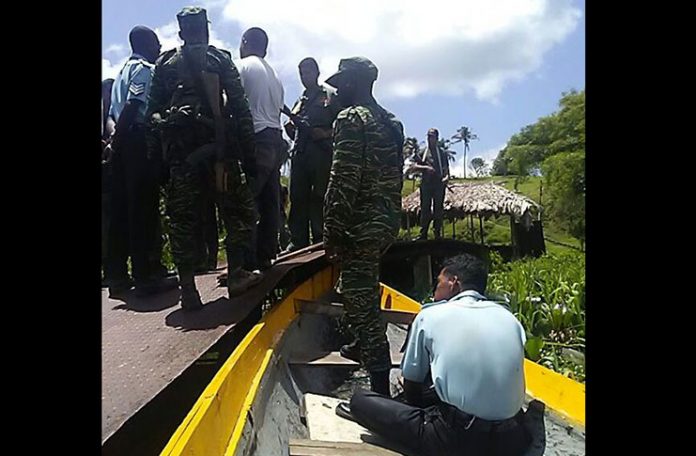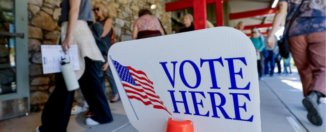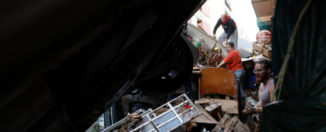¡DE LO ÚLTIMO! Denuncian que soldados venezolanos roban comida en Guyana
800Noticias
Un grupo de soldados venezolanos -armados y vestidos de uniforme- fueron avistados la semana pasada en la vecina Guyana pidiendo comida, según reportó la policía guyanesa.
De acuerdo a una nota publicada este miércoles por el diario el Nuevo Herald de Miami, Christopher Humphrey, inspector de la policía guyanesa, dijo que se dirigió a la frontera que corre a lo largo del río Amacuro, que divide a los dos países, para investigar informes de que militares venezolanos estaban robándole alimentos a los lugareños.
Humphrey dijo que los tres soldados que encontró -dos de ellos con fusiles automáticos- le dijeron que solo habían pedido comida y que no habían dañado a nadie.
Agregó que los soldados cruzaron hasta Guyana en una balsa de madera y parecían estar realmente hambrientos.
“Estaban desesperados”, le dijo al Miami Herald. “Estuvieron un tiempo aquí y me enseñaron una lata de sardinas y el lugar donde hicieron un fuego para cocinarla”.
Humphrey dijo que pensaba que los soldados aprendieron una lección y que ahora ya saben que no pueden cruzar impunemente la frontera en busca de comida.
“De todos modos, eso no quiere decir que otro grupo de soldados no vaya a cruzar el río y entrar en nuestro país”, dijo agregó.
Según esta versión, los militares venezolanos dijeron al ser confrontados por efectivos del vecino país que tenían hambre y que no habían recibido dotación de alimentos desde hace 45 días.
Este hecho vergonzoso, de confirmarse por la Fuerza Armada Nacional Bolivariana (Fanb), habría ocurrido el miércoles de la pasada semana.

Guyanese soldiers confront their Venezuelan counterparts at the Amacuro River border last Friday
Venezuelan soldiers rob Guyanese
…say had no food supplies in 45 days
…issue apology to Joint Services
RESIDENTS of White Water Village, an Indigenous community close to the Venezuela border, are calling on the authorities to establish a police outpost in the area following a robbery committed by a group of Spanish-speaking soldiers last week.
The incident occurred during the day last Wednesday within the North West District village lands, located within two miles of the Amacuro River which separates Guyana from neighbouring Venezuela. Toshao of White Water, Cleveland De Souza, told the Guyana Chronicle that the incident occurred at the Kurasima Creek, a busy spot within the village where persons usually trade items. Kurasima Creek is a tributary of the Amacuro River.
Following the incident, a team of Joint Services ranks who are stationed at Mabaruma, Region One’s only town and administrative capital, travelled to the border and confronted the Venezuelans. The Spanish soldiers told their Guyana counterparts that they were hungry and that no food was supplied to them for 45 days. They then issued an apology to the Joint Services.
De Souza said that prior to Wednesday’s incident, he had received reports that the Venezuelan soldiers were at two locations along the border harassing Guyanese Indigenous Warraus. He explained that each Sunday, the Heart of Palm packaging company , AmCar, which is based in Region One (Barima-Waini) , would send an agent to White Water at an area called “Gajah Landing“ to purchase the palm product known as “cabbage” from the Warraus. He said that the Indigenous group would travel to the area and sell their products to the AmCar agent.
He noted that the village council had received reports that one Sunday in July, the Venezuelan soldiers had ventured up a creek inland to White Water and took away food stuff which the indigenous traders had bought with the proceeds of their Heart of Palm trade. “ ”They stopped the people and took away their things, while armed,” he said.
The armed soldiers repeated the act last Wednesday and De Souza said the police at the Mabaruma Police Station were notified.
The Officer-in-Charge, along with several police ranks and a team of soldiers from Camp Everad near Mabaruma , travelled into White Water on Friday, two days after the incident.
Accompanied by the villagers, the team ventured into the creek where the incident had occurred. Reports are that the team then headed farther to the Amacuro River and spoke with the Venezuelan military ranks stationed there.
“They made the excuse that they were hungry and had no food,” De Souza said, noting that the incident has left the village in fear. Following the incident, the Joint Services ranks camped out at White Water over the weekend and returned to Mabaruma on Monday.
A resident of the village noted that persons are fearful, especially at nights. She said that the border is within walking distance of the village and businessmen are concerned that elements from Venezuela would attack the village at any given moment. “They call them sindicatos (bandits) and we know how the situation is over in Venezuela,” De Souza said.
Reports are that two armed men were spotted in the village at a shop one night last week and residents quickly closed their doors.
The men in the village scoured the area for the men but came up empty –handed. In recent months, scores of persons who migrated to Venezuela in the past, have been returning to the North West District, some of whom have set up small businesses in the region. Venezuela’s economy has been in turmoil over the past three years. Tensions are high in Caracas as pro-government and opposition supporters of President Nicolas Maduro clash over the state of the Bolivarian Republic’s economy.
According to an Al Jazeera report published in May this year, Venezuela is experiencing the worst economic crisis in its history, with an inflation rate of over 400 percent and a volatile exchange rate. According to International Monetary Fund (IMF) figures, in 2016, the country had a negative growth rate of minus eight percent, an inflation rate of 481 per cent, and an unemployment rate of 17 percent that is expected to climb to 20 percent this year.
Over the past decade, it has been the region’s poorest performer in terms of growth of GDP per capita, even though the country sits on the world’s largest oil reserves. Oil prices have been falling since 2014, which has left the economic system unable to maintain the system of subsidies and price controls that functioned during the oil boom years.








